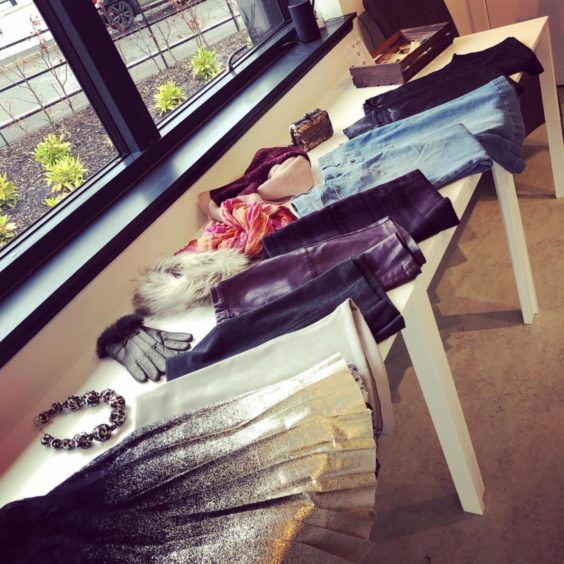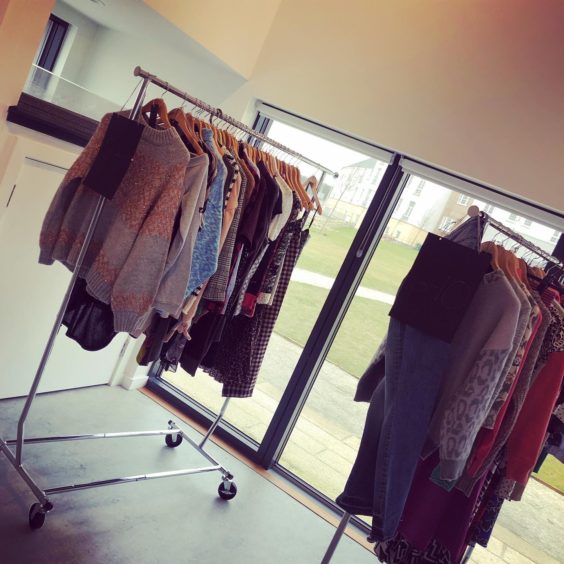It has never been easier to shop online, particularly when it comes to your wardrobe.
From free delivery to the lure of a bargain, you can buy a new outfit with just one click.
And the thrill of the purchase is not only quick to access, it can be weirdly addictive.
It would seem our love of clothes doesn’t extend to wearing them however, after a study showed that UK shoppers own a staggering £10bn worth of clothes which remain unworn.
We all have that item in our wardrobe, be it the coat we couldn’t resist then quickly forgot about, or that pair of jeans we swear we’ll squeeze into by next year.
People hold on to clothes because it is a reminder of the good times, the dress from nostalgic days of clubbing or the bikini worn on honeymoon.
Our stubbornness to donate or repurpose would perhaps not be quite so bad, were it not for the crippling impact of fast fashion on the environment.
We quickly forget about those unloved items tucked away in drawers, in favour of buying yet more cheap garments to keep up with the latest trends.
Our addiction comes at a terrible price to the planet, though.
The fashion industry is the second-largest polluter of clean water globally.
It produces 10% of all carbon emissions and pollutes the ocean with microplastics.
We can all play our part to stem the tide, from buying more sustainably to curtailing our shopping habits all together.
Mum-of-two Amanda Fullerton admits she was a complete shopaholic prior to having children.

But with two maternity leaves in a short space of time, her finances and priorities changed.
Having done a complete U-turn on her own shopping habits, Amanda is now paving the way for a more sustainable way of shopping in Aberdeen.
She held her first clothes swap in Aberdeen last year, and now plans to open her very own one-stop clothes swap shop.
Her events, which are held at various venues across the city, have fast become a sell-out success – with people flocking to get a bargain and meet like-minded shoppers.
Here, she explains why secondhand not only means sustainable, it could even see you grab a designer bargain.
I think the initial spark for me was watching Stacey Dooley’s documentary in 2018.
I was staggered by the impact of fast fashion. There were also other factors at play though.
My children are three and one, so I had two maternity leaves quite close together.
My finances obviously changed, but so did my wardrobe.
I wasn’t in need of so many going-out outfits, my priorities were different.
It was around this time that I started feeling a lot more conscious about sustainability.
I used to work in oil and gas, and I feel embarrassed at my former attitude to clothes.
I was a compulsive shopper.
My habit was made even easier by the fact that I worked in town, so I thought nothing of buying one new outfit each week.
Come Friday drinks, I’d be the person in a brand-new set of clothes.
People would say to me that they never saw me in the same outfit twice. I prided myself on that.
I’m embarrassed of my younger self now of course.
But I also see this attitude in the younger generation today, it’s devastating.
Due to the rise of social media, teens feel that they can’t be pictured wearing the same clothes twice.
I held my first clothes swap event last year, with tickets to control numbers.
I tell people to bring two to four items, not from the lower end of high street or internet – as a way of fighting against fast fashion
The items have to be in good condition, wearable and clean.
I collect them on the day and give people tokens – tokens are the currency.
Then I turn the venue into a boutique, and people trade their tokens for clothes.
It’s amazing what we get, the quality is amazing and a lot of the items are brand new.
It’s made a huge difference to my own life, because I’ve learned how to wear my wardrobe again.
 The events are so much fun, everyone comes with the same attitude and enjoys it.
The events are so much fun, everyone comes with the same attitude and enjoys it.
I think there was maybe a bit of cynicism in the beginning, people thought it might be like a charity shop.
Everyone goes home happy with their swap, and people are really supportive as well.
So if something doesn’t suit someone, we’ll say.
I always tell people that you shouldn’t be driven by the size – you can make it work with a belt or tailor it.
It’s about empowering women, let’s all lift each other up.
I think there’s this statistic, we each have £447 worth of unused clothing in our wardrobe.
Think about that for a second.
I’m pretty excited to launch my own swap shop, I’ve got such a happy feeling going forward.
